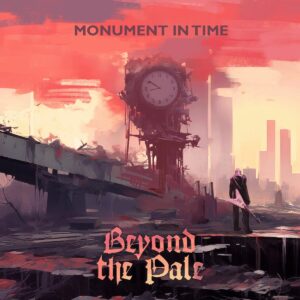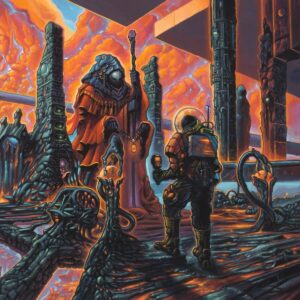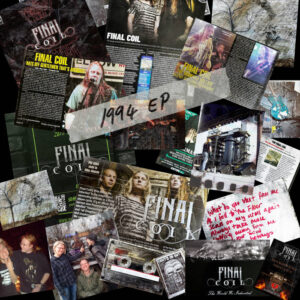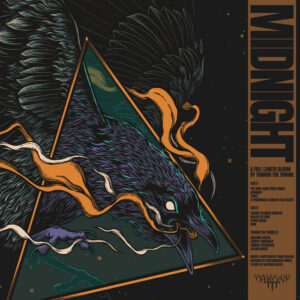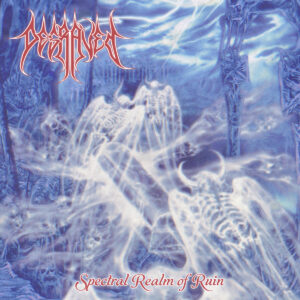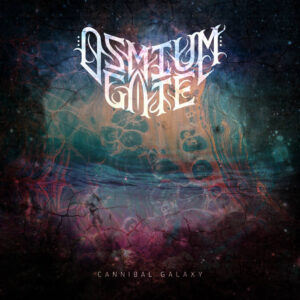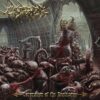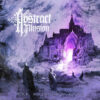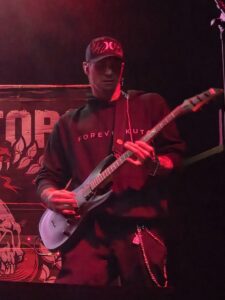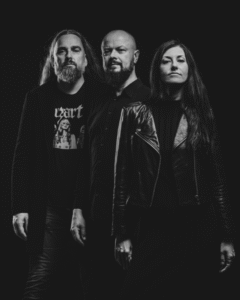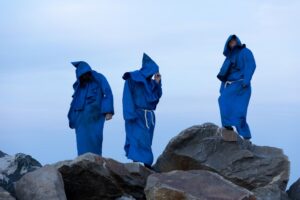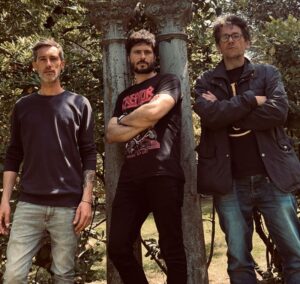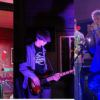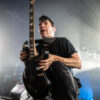Fawaz al-Shawaf
Creative Waste
Three years later CREATIVE WASTE returned for another historic evening. This time the fears and concerns were much different. Instead of worrying about being incarcerated or heavily fined, the fears were about turnout and sound engineering. And while the worries about sound engineering were warranted (the band experienced a few minor technical hiccups), the crowd was abundant and enthusiastic. Fans who could not come into the venue because of capacity issues were happy to stand outside and watch the show through the large panel glass walls. Metal Temple editor Gary Hernandez had the privilege of attending. It was mind-blowing.
For those new to CREATIVE WASTE, they formed in 2002 and have one demo, one EP, one live split, and two full-length albums under their belt. They are currently a foursome, with brothers Fawaz al-Shawaf (guitars, vocals) and Talal al-Shawaf (drums) being joined by Abdulaziz al-Bayyat (bass) and Hussain Akbar (guitars). Most Metal fans categorize them Grindcore. The band does not disagree. A few weeks after the March 22 show, he had the chance to catch up with Fawaz al-Shawaf to talk about their history-making shows in the Kingdom, the Metal scene in the region, their plans for the future as well as some insights into what makes CREATIVE WASTE tick.
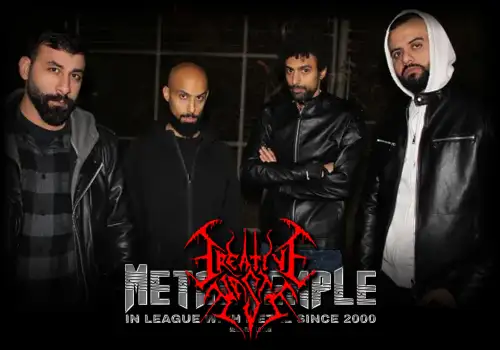
Actually, we formed in 1999. My father had a work assignment in the US, Virginia specifically, and he took us along. We lived there for a year. Right before that, though, I was just discovering heavy, aggressive music from movie soundtracks and video games. When I got to the US, it was full blown at that time. You had KORN playing on the radio. You had the DEFTONES, MEGADETH, TOOL, all these bands that I never knew, that I was never exposed to before, at least intelligibly. By that I mean I would just hear random bands that I couldn't name. Like, I would hear NAPALM DEATH on "Mortal Kombat," you know, I would hear stuff like that. So anyway, when we got to the US I was at that age, in the eighth grade, where I had the attention span to actually chase down names and really get familiar with heavy music.
That's how we got started. I got to the US, and I met our future guitarist, Essam al-Ghamdi, when I went to school—ISA, Islamic Saudi Academy. I met him there and we clicked immediately. We had similar interests and we just said, "Yeah, let's start a band." It was just like that. As far as getting other members, I said, "Don't worry, man, I got a brother." And now he's our drummer (Talal al-Shawaf).
No, No. We didn't play any instruments. We only had ideas. That's it. None of us had ever touched an instrument before. Just like, yeah, "Let's start a band and then let's figure it out."
Exactly. I just loved it. I don't know. We just immediately gravitated towards Metal. I don't know why. It just started as an idea. We were kids, dreamers.
Kind of. At first, we came up with horrible names that thankfully we had the sense not use. The first name we toyed with was "Silence Til Death." We were kids, we were teenagers. And then we thought, "Wait, abbreviated that's STD!" [laughs] Not a good idea!
We came up with the name CREATIVE WASTE after we got back to Saudi. I was only in the US for a year—from the summer of '99 until the summer of 2000. A year after that our guitarist, Essam, came and we picked up where we had left off. Essam and I were thinking it had to be related to do with things being wasted.
In Saudi at that time there was no music scene of any type. There was nothing. Maybe if you wanted to count the underground folk music and even then, you only got to play it to your friends in your house. Basically, only stuff like that. There was no music scene of any kind here. Nothing. Not even recording. Most Saudi artists recorded outside of the Kingdom, like in Lebanon. There were a few studios here, but not official. It felt like there was nothing here musically for anyone. That's how it felt. Yes, you got stuff on television, on the satellite, on the radio—you got all this music of Saudi musicians, Middle Eastern artists, and so on. But if you looked in Khobar, left and right, there was no concert ever to my knowledge. Technically there probably were, but generally speaking that's how it felt. It's like these things you only hear about, but you never see. So the word "wasted" seemed important because it felt like things were being wasted. But that wasn't my concern. We wanted to do this. It was a dream, and we just had to find a way.
We started playing around with the word "waste" and the word "creative." First it was "wasted," and then it developed by adding the word "creativity." Like our creative drive was getting wasted. I think it was more of a subliminal thing almost. We felt it, but we didn't fully understand until we were able to look back. And now it actually makes sense why we gravitated toward those words . . . because that was it. Those were the two things we felt the most. Throughout most of the world, creativity is usually not encouraged or widely rewarded. People tend to look down at creativity as if it's less than. So that was the general idea.
We never really bothered thinking too much about it, but, yeah, I used to hear it every day. Naturally, people doubted us. We were just teenagers who didn't know what to do. I couldn't even tune my instrument. We were like literal cavemen when it came to learning our instruments!
Both. There's was only one store here, aDawliah, and you would just buy what was there. Luckily, they would get some Yamaha brands, Premier as far as drums go. Guitars you had Samick. My first guitar was a Samick. Then they started getting Squiers and stuff like that. It was very limited. Still today, your options are limited, but at least there's something.
Well, basically, they looked at us weird, like: What are you doing? They didn't even know the style to begin with. Remember, Metal was not a thing here. When I introduced people to bands that even at that time were considered more palatable compared to today's extreme metal—nothing like Death Metal or anything—they would immediately react like: "Oh, what is this?" In their minds rock music was already crazy. And what we were trying to do was even beyond that to them. It was unfathomable.
My dad was supportive. He got us instruments and everything, but he didn't like what we did. To this day, I don't think he has listened to even 30 seconds of any of our songs. So, yeah, it was just like that the whole time.
In late 2003 there was a message board called SA Metal. It was a great way to connect the very few artists that were around. That's how we started to form a scene, at least locally here in Khobar, Dammam, Qatif. Almost everyone knew everyone. That's how I met Waleed—he was there at the event. He's the one who taught me how to read tabs. That's how I was able to get somewhere on guitar. There's no way to tell the recording story without that.
Waleed, he knew the rest of the people here, like Mohammed al-Hajjaj from SOUND OF RUBY. Waleed is from a band called INVERSION and Kamal Khalil from DEATHLESS ANGUISH. Well, they're all in the same bands. We all borrow the same members. Like my brother plays drums in SOUND OF RUBY, I play drums with INVERSION. We all make up a small scene where everyone helps each other out.
Anyway, Waleed connected us to Mohammed al-Hajjaj who connected us to Kamal Naomi, the guy who ran SA Metal. And I had distant relatives who had a space in Qatif and there was a drum set there. Kamal was the technical guy. He used to record demos and stuff like that. He's the one who recorded for us. We just went with it and made do with what we had. Like I said, we didn't know a lot, but it came out okay. I mean, it's not the worst recording in the world. We captured something.
One funny story about that recording: I remember doing the vocals at Kamal's apartment—it was on the top floor of the building, and they were afraid the sound was too much because I'm pretty loud. So when I was screaming into the mike, he would throw a blanket over me and I would record the vocals with a blanket over my head!
I would say we kept maturing. For example, at the beginning we had no direction. We didn't know what we wanted to write about. I wasn't participating in writing lyrics in the beginning. I had nothing to write about, really—or rather, I didn't know how to articulate my thoughts very well. With "Colonies," that was all Essam. He was really into PIG DESTROYER type of lyrics, JR Hayes, and abstract stuff like TOOL and whatever. I mean, to me the lyrics made little to no sense, but they were cool to read.
Then two or three years later we released "Cruelty Beyond Conception." That's when you can hear the change in style. We had a direction. We were getting closer to what we wanted. Even prior to "Colonies," we were experimenting with other styles of music. We really just kept trying to find our sound, our style.
But, yeah, by "Cruelty" we more or less knew what we wanted to talk about. I contributed lyrics for maybe one of the songs. Before I was just writing riffs along with songwriting. By "Slaves to Conformity" I started writing all the lyrics. So at least from a lyrical standpoint, or what I wanted to express verbally, I was able to find my voice as time progressed. I found a way to trigger it. I had things I wanted to say, I just had to learn how to articulate them. In the early days, I didn't know how to get that spark, but by "Slaves to Conformity" I was able to find it more consistently.
We thought about it, but we have a lot of new songs, too. But it's definitely something we've considered. When we played the March 2022 show, we played the outro of "Autopsy Infringement." We used that outro as the intro for "Retribution." So, yeah, there are definitely things from that demo that are very usable to this day.
Well, I have a bit of an idealistic approach. I always expect more, as in things can always be better. I used to get bullied when I was younger, so I have always had this disdain for injustice. And, yeah, I just really, really don't like bullies. Seriously, as in a violent intent towards bullies. Also, I think it stems from an innate tendency of human beings to hate being lied to. No one likes to be on the wrong side of things. Some people don't want bad things to happen to others; and then there are some people who are just fine with it so long as it's not happening to them. You know, not their problem. So injustice is a bit of a theme for me.
Yes, you definitely hit the nail on the head, but it's also deeper than that. As an example, when people live in their bubbles, when they stereotype certain types of people, they cut off the line of communication. Then it's done, that's it, there is no chance because you will never hear the other side. That's how propaganda works. They're counting on you not communicating with the other side. They don't want you validating whatever you've been told. As long as people are kept separated, there's no way they can truly know if what they've been told is true or not.
Because human psychology is the same. It will never change. That's why these tactics that have been used throughout history will always work. Human psychology never changes. Technology and all that gets advanced, but at the end you still see terrible outcomes again and again because if you don't fix what's inside you, nothing is going to change. It's the same principle.
Yeah, that was on "Cruelty Beyond Conception." That was the first track.
Yeah, that's the thing. Things are always deeper than what the world or media is willing to admit. It's like the oversimplified narrative is usually never true. There's always more to it, but as long as you care enough, you'll find it. You just have to care enough to look. As long as you're not just giving lip service or being a slave to conformity. [laughs] What is it that Gandhi said? "Actions express priorities." I should also mention that part of the lyrics are about role models I look up to who have that drive for making things better and bringing people together, as cheesy as it sounds.
I'm glad you think so. I also like what you're saying about how it plays into the stereotypes to this day. I watch TV shows and they always feature things like criminals or whatever and they are always listening to Metal. Not always, but most of the time, you know, like why? Why is it only criminals who would be listening to Metal? The media still to this day doesn't help.
Honestly, the hardest part was managing everyone's expectations. A lot of people were expecting it to be a complete disaster. They were afraid. I thought it was an irrational fear. They were just afraid because a lot of them were so used to the culture before Saudi Vision 2030. They were afraid, as in, "Are we really allowed to do this?" It's like they were almost trying to find something to be afraid of. If it wasn't the law, they were worried about what their family or friends might say, what their coworkers might think. People were afraid for their jobs. They were afraid of how they'd be seen socially and in their circles. Let's say someone was thinking of getting married and it might affect their prospects somehow.
For me, I was okay because maybe I live in a bubble. I'm used to taking on things that people say you can't do. It drives me more. I just kept my head low, and I just went through. Sometimes you get these negative thoughts planted by people expressing their negative views. I remember telling myself I had already thought it through. I had already decided, and any future deliberation was just like going in circles. There's always risks. I try not to worry about things that are out of my control. That's it. I just have to make my peace with them and follow my instinct.
The organizer is the one who came up with the idea, but I don't think they fully understood what they were asking me. But I said, "You know what? Let's do it." Because I might be the one who's wrong, you know? When they approached me, it was like that line from the movie "Master of Disguise"—"It's so crazy it just might work." I said, "Let's do it because it's so unorthodox, so unexpected." I mean a Metal show in Saudi Arabia!
Yeah, none of that. I would say the only real problems were from bands holding themselves back and talking themselves out of it. They were policing themselves; they were their own worst enemy. They allowed their doubts and fears to get into their heads and as a result, a lot of bands canceled that were supposed to be on the bill. The bill kept changing. It felt like that game where you keep removing the chairs.
It was our second for sure. After the 2019 show, there were bands like IMMORTAL PAIN and WASTED LAND playing in Jeddah. I started seeing them in a venue called Makan. And then the pandemic got in the way. But, yeah, our second show was still like maybe the fourth or fifth heavy music show in a period of two or three years.
Way more relaxed. You can't even compare. It was like night and day. I was just worried about technical stuff because I was setting up the sound and everything on top of performing, so I knew I wouldn't get things perfect. Not to mention the original plan was only for us to perform and then a few other bands approached. So that was my main concern. I was just worried about the sound and all. Yes, we had technical difficulties at the very end, but I would say it could have gone much worse. Thankfully, the positives outweighed the negatives. And people had fun. I had fun. Especially what you just mentioned about the vibes and all that makes it worth it. Compared to the first one, it was pretty smooth sailing.
Close, but not quite. It was the first time I was performing both guitar and vocals on stage. But that's not actually true either because if you look at our first show, like our first two or three gigs, I would sometimes do vocals and guitars . . . but then we switched it up. We were still trying to find our sound. But now we found our way. The new—let's say approach—is I fully do guitars and vocals now. I'm fairly certain this is how we'll keep it. We already started writing the new album and we're five songs in now. There are probably going to be seven or eight tracks. The length is already clocking in as a full-length album and the new songs require two guitars.
Yep, the current lineup: My brother, Talal (drums). Abdulaziz al-Bayyat (bass), Hassain Akbar (guitars), and me (guitars, vocals).
My youngest brother, Faris al-Shawaf. He's 16.
I think so. I mean, people came from Bahrain, Jeddah, Riyadh, all over. They're willing to get on a plane and or train or make the trip just to see us. That speaks volumes, you know. It's a rare occasion to see a Metal band here, so fans are really dedicated. I think the Metal scene here is stronger than almost all other styles of music that exist in Saudi. I can't say the Middle East, but in Saudi, it's probably the strongest. I know the scenes that have biggest support are Metal and Electronic, as far as I hear. I haven't witnessed it myself. It's very hard to prove what draws people to Electronic music. Is it the music, or is it the party? But I can say for sure the Rock and Metal scene is very, very strong here.
It's slightly easier because there are more venues but not that much because there are still regulations. You have to go through a lot of paperwork to get a band approved. One way they make it easier is to do it free of charge to avoid all the headaches so the bands can perform. Bahrain is definitely one of those tiny but mighty scenes and we're very close with the Bahraini Rock and Metal scene. Like SMOULDERING IN FORGOTTEN is one of the well-known bands there. Omar Zainal was our guitarist for a while, during the some of the European tour, and he helped out with some of the guitars and on "Condemned." So yeah, we're pretty much the same family I would say. You have HELL NIGHTS, you have LUNACYST, MOTOR MILITIA, RAIN IN HELL, and now a new band called NECROSIN from Bahrain. But right there I almost named all the bands that we see frequently in Bahrain. I hope I didn't miss anyone!
But since COVID you don't get to see much. But all the bands on the "Metal! Live in Bahrain" are pretty much there. We play in Bahrain regularly. It's just a really, really cool Metal scene. It's like one of those scenes you were just talking about. They don't take things for granted as much. It's a tight knit community and we're lucky to be a part of that. And Hani Taqi with Studio 77 is a big help when it comes to recording and with the whole Metal scene.
There are a lot of sources. Sometimes you draw inspiration you don't even realize. I feel like when people think of musical influences, they only think sonically—as in this scale or this type of riff or this type of rhythm—but it's more than that. It's like the work ethic or how they carry themselves. So, yeah, I draw influences from more places than I can mention, but I know that classical music has a huge impact on me. Classical music, movie soundtracks, video game soundtracks, electronic music.
When it comes to like really dark and high energy, I would say closer like something from "Mortal Kombat" or "Blade" or "The Matrix," some Industrial music for sure, and things with a lot of heaviness and groove. At the very beginning for me it was bands like SEPULTURA, because at that time that was all I knew. Then as I delved deeper, I found bands like CRYPTOPSY, CARCASS, NAPALM DEATH, NASUM, and so on. And then I started expanding my palette. So my influences can come from any style of music I hear, like an idea that I feel could be useful, or a concept that could lead me to something new. I just try to really absorb.
I feel like music—and anything really in life—is way more interesting when you're putting on the lens of someone who is trying to find something. For instance, if I watch footage for hours with no point, I can't do it. It's too exhausting. But if I have an objective in mind, I can spend hours doing it because I'm working towards something. I'm trying to find something. It's like that with Hip Hop, old-school Hip Hop, underground Hip Hop. Even the beats, the idea of having a hook, something that draws you back, I really like catchy choruses and I like things that are memorable.
A lot of times Metal bands focus too much on the technicality and lose out on the feeling and the soul. For me, at least, it feels like they're missing the point. Sometimes I hear music that's very technical, very demanding, but there's nothing memorable. I can't remember anything. You just forget about it. I know the guys are talented, but it's not speaking to me. So, yeah, from all these influences, I try to create what I would love to listen to.
Hmm. I don't only listen to Metal. I listen to some Hip Hop, even some popular music, you know, like singers like Aurora, like more modern artists. I've been recently listening to INTESTINE BAALISM, a sick band from Japan. They just get it right. But I would say, the last record I bought was maybe a DYING FETUS record. The last one, "Wrong One to Fuck With."
Not to me. Even if they did, it's not how I judge my music. But because I grew up with CDs and cassettes, I think those are my preferences. But for convenience, you can't beat digital. But I still like to have physical. Even if I'm not going to listen to it, I like to keep it and then listen to it on the digital. That way I feel more like I contributed to the band somehow.
I'm not a big fan of Spotify. If a band is on Bandcamp, I'll go there, purchase the record, and then I'll listen to it on a streaming platform if I have to. I like to buy it in some form before I stream it because I know the artist is probably not going to see a cent from it otherwise. I know I almost never get any money from Spotify. It's negligible. But with Bandcamp I immediately get notified. When it comes to digital right now, they don't change anything, they don't mess up. I say Bandcamp is the best way to support bands that don't have physical copies.
We still have a few songs to finish, like maybe two or three. Then I think we'll be ready to start recording in the studio and hopefully release it before the year is over. It might be different to any of our previous records, but our core elements are there, they're just presented differently.
I identify with the word Grind because of the D.I.Y spirit. What do you call it? I'm not going to say the ethos, but yeah, more or less, because bands like NASUM and NAPALM DEATH were such a huge influence on us with their lyrical themes. But when it comes to music and instruments and all that, honestly, if I look back, most of the artists that I really like are more or less on the same wavelength. And really Grind was what we were called at the beginning, so it just stuck with us. Especially with "Cruelty Beyond Conception." But if you listen to "Slaves to Conformity," that's Death/Grind which makes sense because CRYPTOPSY is one of my favorite bands. Especially early CRYPTOPSY. But I'm not limited to a style. I feel like these styles should just help you navigate. People shouldn't obsess over styles. Some people are still stuck in that box. They have to know your subgenre first before they listen to you. It's like the category dictates what their opinion of a band will be.
There might be show in Saudi after Eid, so late-May probably. As far as tours go, we're aiming to build a tour around the U.K. Death Fest because we're scheduled to play there in September. We were supposed to play that show two years ago, but it kept getting postponed because of COVID. So hopefully we'll do our first UK tour soon. We've toured Europe, but we never toured the UK. Ideally, we'd release a record and then support it, even though we've never toured with our last record, "Condemned." COVID hit right when it was released.
Just keep supporting Metal. Support your local scene, support your bands!
More results...
